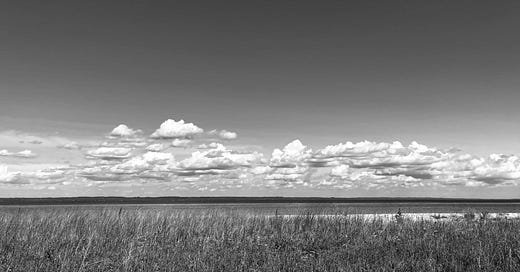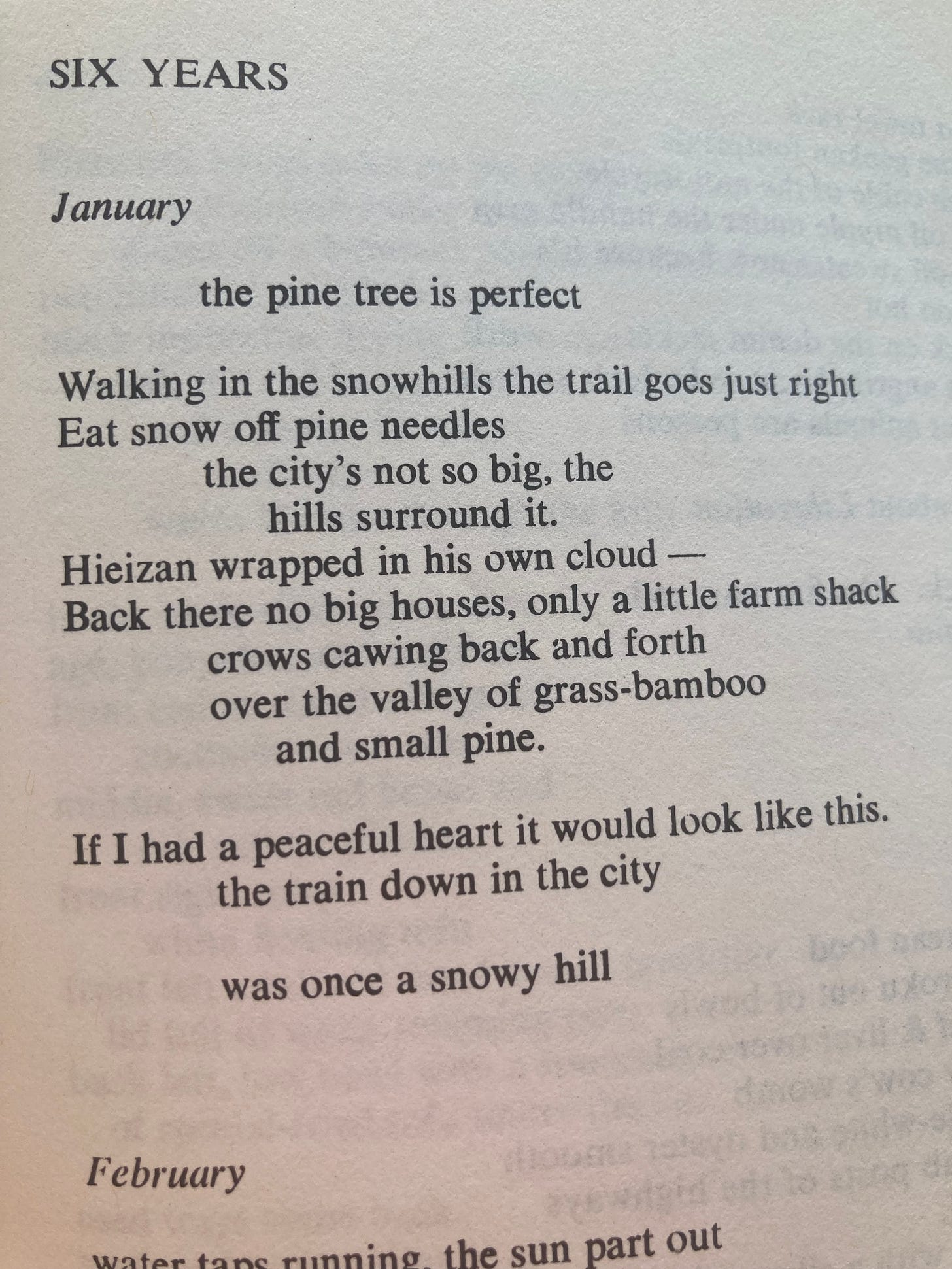“What should be [a person’s] morning work in this world?”
- Henry David Thoreau
Monday mornin’ comin’ down. Did you get this email at work? Was it wedged into your inbox between a TPS Report and a LinkedIn request? I imagine someone reading this as a way to tune out of a staff meeting. Or perhaps your work falls outside the bounds of a screen. Lucky you. Maybe you are even retired. Luckier you. Perhaps you are in desperate need of work. We are pulling for you.
What brings you to work? Depending on the angle of this question, it can be read as practical or existential. This question flippantly tripped off the keys and now I feel the need to catch it before it falls. I did not intend to ask by what means are you physically transported to work, but I assume it is some sort of machine; a vehicle or a computer. A worthwhile aside to note, but I am not steadying to dwell on this mechanical reliance. The question I meant to kick to the center is—are you brought to your work by duty, professionalism, paycheck, or vocation?
Whatever your relationship status with work is, I am sure it is complex. Muddy combinations of motivation. Confounding as a peanut butter flavored bourbon.
Wherever you are on that vocational spectrum, I invite you to look inward for the specific work that you must do in the world. But to do this you have to first clear the air. Pause. Locate a voice in your head. The one with the bullhorn relentlessly barking a scrolling commentary. This is your internal job reviewer. Perhaps last week your internal job reviewer was slapping you on the back, calling you a mighty success, an exemplary employee…and today they are wondering how the hell you still have a job? Perhaps they are saying this isn’t just a lull and have hit the ceiling of your talents. And no one wants you around. The constant feedback from your own internal job reviewer is limiting, askew, and irritating as hell. There is a question that I want to ask you out of earshot of this trolling internal reviewer. A question intended to move you closer to the heart of your work. So for the remainder of this email send your internal job reviewer—a constant emotional wreck—out on a smoke break. I have a question for you that they cannot hear. A question that goes beyond perceived performance. One that holds the center of purpose.
What is your morning work?
In his book Walden, Henry David Thoreau asks, “what should be [a person’s] morning work in this world?”
What Thoreau meant by “morning work” was human activity done with deliberate wakefulness.1 Take a swig of that line again, work done in deliberate wakefulness. This is the opposite of busy work, or activities that look, smell, and pass as work. Theologian Ilia Delio writes, “Our lives have meaning and purpose. We are created to participate in something that is more than ourselves; that is, we are made to contribute to the fullness of Christ and thus to help bring about the unity of all things in God…We either help build this world up in love or tear it apart. Either way, we bear the responsibility for the world’s future, and thus we bear responsibility for God’s life as well.”2
I want to stitch Thoreau’s “morning work” to Delio’s “world-building”. The work that is yours to do in deliberate wakefulness helps build this world up in love. It can be distracting to think in ginormous slappy slang like work that “changes the world”. Drop that change into your back pocket. Keep it in the dark and focus on discovering the work that is yours to do in deliberate wakefulness; growing a vegetable garden, raising kids, researching what drops you into depth of possibility…sure, all of these specific morning works could lead to expansive yields, but first discover your morning work without focusing on the output. That is what matters.
Morning work is the lever we borrow from Archimedes. When we engage in morning work, we lean on our lever and build the world up in love.3
So before that bugger of an internal reviewer comes back with a ridiculous set of new critiques, what is the work you do with deliberate wakefulness? What is your morning work?
July NonRequired Reading List
Feed the Wolf: Befriending Our Fears in the Way of Saint Francis by Jon M. Sweeney (Get it at the Public Library or Bookshop)
St. Francis of Assisi painted many images on the bare walls of history. Kissing lepers. Getting naked in church. Preaching to the birds. Befriending the wolf in Gubbio. Howling prayers at the moon. St. Francis has been an animating figure in my life, inspiring the sweat of possibility in Christ’s love for the world in momentary glances, walks, and open sky prayers. He is easy to lionize. Jon M. Sweeney does a number of services to St. Francis in Feed the Wolf. Sweeney takes the legendary stories of a saint into the heart of the modern reader, always centering the question, what do these tales have to teach a person in the chaotic days of our times?
The throughline of vulnerability in St. Francis speaks to me. Every step before God, stranger, community, and the world becomes an act of vulnerability. St. Francis exemplifies nakedness before the unknown, this “vulnerability became his way of learning who he was and his role in the world.”4 He is a daring exemplar who shows “a way of knowing God that is much deeper and closer to us than any form of belief or conformity to the status quo. This knowledge is the awareness of our lives and our experiences as part of the life of God.”5 One might say he discovered his morning work.
Feed the Wolf is for any reader who needs to befriend the wolf (pack of wolves) in their life. Sweeney writes of this surrendering to the common person seeking a way of wakefulness among the wilds.
The Back Country by Gary Snyder (Get it at the Public Library or Bookshop)
I have been woefully lax about reading this summer. I carried stacks of books across the country. Instead of being read they got creased, greased, and dinged along the way. Poetry was the one exception. Morning meditation is best accompanied by poetry and I found The Back Country on a shelf at my in-laws. The spine-on-the-forest-floor perspective on the cover and Snyder’s grin on the back needled me. I opened it and fell in. Snyder’s direct and descriptive lines are fingers pointing at western pines, Zen, Kenji, and India. Love found, lost, and remembered. Here is a little number I would often revisit before sitting in silence before Lake Michigan.
The Back Country does not strain. Like much of Gary Snyder’s poems they are born of a virgin forest and presented as such. The birth pangs are present, but rarely commented on. But I could be wrong about that. All I really know is that I love Gary Snyder.
Contemplify Update
Season Four is out and walking with a whistle on its lips. I am proud of this season and the good folks who have joined me in wondrous conversations. As always you can find the complete list of Contemplify episodes here and below are the four most recent episodes. The next episode is coming out real soon. So polish the silverware later.
Scott Avett on Being Here for the Feast (Season 4, Ep 3)
Haleh Liza Gafori on Putting Mystery in the Middle (Season 4, Ep 2)
Belden Lane on the Unbroken Desert of God (Season 4, Ep 1)
Your Naked Freedom (Season 4 Trailer)
All episodes are available from Contemplify through these fine outlets: Apple Podcasts, Spotify, Stitcher, Podbean, or Overcast
Arts & Articles
CAN YOU HEAR ME SMILING? (YouTube): The music of Scott Ballew hits me right between the front teeth. Winsome turns of phrase and imagery that smartly paints on the inside of your eyelids. The man has walked through some swamps too. This short documentary captures his spirit, much the same way I hope my conversation with him from a few years back does too.
RAGE AGAINST THE MACHINE (The Free Press) : A longish read that stokes thoughts of what AI means as a technological extension of soul/body and a potential human spiritual response. I am less inclined to think that an individual response to a systemic change is as easy to pull off (and the author never says it is easy). Ever since the roll of the first wheel the question of the impact of technology has been present. Let’s keep that conversation alive. (h/t Mark)
Tall ears
grow low
to hear the passing sounds
of work done,
with deliberate wakefulness.
building the world
before them.
In morning work,
Paul
H. Daniel Peck, Thoreau's Morning Work: Memory and Perception in A Week on the Concord and Merrimack Rivers, the "Journal", and Walden (Yale University Press:1990), X.
Ilia Delio, The Hours of the Universe: Reflections on God, Science, and the Human Journey (Orbis Books: 2021), 41-43.
In this, we follow the guidance of the poet who says, “We are not machines. We are a unity of purpose.”
Jon M. Sweeney, Feed the Wolf: Befriending Our Fears in the Way of Saint Francis (Broadleaf Books: 2021), 53.
Ibid., 182.





Paul your monthly correspondence is so inspiring, after reading them I often want to go pray, journal or go on meditative walk. Thank you so much for sharing what inspires you, it also inspires many !
Beautiful, funny and thought-provoking as ever. (You had me at TPS Reports lol).